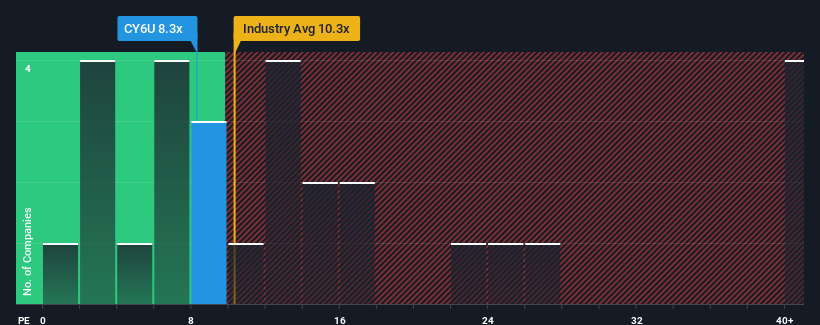
When close to half the companies in Singapore have price-to-earnings ratios (or "P/E's") above 11x, you may consider CapitaLand India Trust (SGX:CY6U) as an attractive investment with its 8.3x P/E ratio. However, the P/E might be low for a reason and it requires further investigation to determine if it's justified.
With its earnings growth in positive territory compared to the declining earnings of most other companies, CapitaLand India Trust has been doing quite well of late. It might be that many expect the strong earnings performance to degrade substantially, possibly more than the market, which has repressed the P/E. If you like the company, you'd be hoping this isn't the case so that you could potentially pick up some stock while it's out of favour.
See our latest analysis for CapitaLand India Trust

How Is CapitaLand India Trust's Growth Trending?
The only time you'd be truly comfortable seeing a P/E as low as CapitaLand India Trust's is when the company's growth is on track to lag the market.
If we review the last year of earnings growth, the company posted a terrific increase of 37%. The latest three year period has also seen a 18% overall rise in EPS, aided extensively by its short-term performance. Accordingly, shareholders would have probably been satisfied with the medium-term rates of earnings growth.
Shifting to the future, estimates from the four analysts covering the company suggest earnings growth is heading into negative territory, declining 8.9% each year over the next three years. That's not great when the rest of the market is expected to grow by 9.6% each year.
In light of this, it's understandable that CapitaLand India Trust's P/E would sit below the majority of other companies. Nonetheless, there's no guarantee the P/E has reached a floor yet with earnings going in reverse. Even just maintaining these prices could be difficult to achieve as the weak outlook is weighing down the shares.
The Final Word
Generally, our preference is to limit the use of the price-to-earnings ratio to establishing what the market thinks about the overall health of a company.
As we suspected, our examination of CapitaLand India Trust's analyst forecasts revealed that its outlook for shrinking earnings is contributing to its low P/E. At this stage investors feel the potential for an improvement in earnings isn't great enough to justify a higher P/E ratio. It's hard to see the share price rising strongly in the near future under these circumstances.
You should always think about risks. Case in point, we've spotted 3 warning signs for CapitaLand India Trust you should be aware of, and 1 of them is a bit unpleasant.
Of course, you might also be able to find a better stock than CapitaLand India Trust. So you may wish to see this free collection of other companies that have reasonable P/E ratios and have grown earnings strongly.
New: AI Stock Screener & Alerts
Our new AI Stock Screener scans the market every day to uncover opportunities.
• Dividend Powerhouses (3%+ Yield)
• Undervalued Small Caps with Insider Buying
• High growth Tech and AI Companies
Or build your own from over 50 metrics.
Have feedback on this article? Concerned about the content? Get in touch with us directly. Alternatively, email editorial-team (at) simplywallst.com.
This article by Simply Wall St is general in nature. We provide commentary based on historical data and analyst forecasts only using an unbiased methodology and our articles are not intended to be financial advice. It does not constitute a recommendation to buy or sell any stock, and does not take account of your objectives, or your financial situation. We aim to bring you long-term focused analysis driven by fundamental data. Note that our analysis may not factor in the latest price-sensitive company announcements or qualitative material. Simply Wall St has no position in any stocks mentioned.
About SGX:CY6U
CapitaLand India Trust
CapitaLand India Trust (CLINT) was listed on the Singapore Exchange Securities Trading Limited (SGX-ST) in August 2007 as the first Indian property trust in Asia.
Undervalued with solid track record and pays a dividend.


